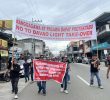MANILA, Philippines � In a remittance slip, there was an additional US$50 that Cesar Dimasupil�s daughter Arlene sent from London. But he remained stoic. �That [money] would just even things out,� Dimasupil says of the dilemma that most families of overseas Filipino workers are facing under a stronger peso and a record-low inflation rate.
Dimasupil, like most Filipinos brought up in a male-as-strong society, says he doesn�t know if he should celebrate for getting the added money from something he said he shouldn�t have asked from his daughter in the first place. �But what can I do? They say the strong peso could lead to lower prices. That hasn�t happened in the past months,� Dimasupil said.
The Dimasupil family shares the conundrum of a Philippine economy that a recent World Bank report said has been growing, in part because of the cash sent by nearly eight million Filipinos temporarily or permanently working or living abroad.
In a report released by the WB last month, it noted that the stronger peso helped inflation rates to fall to 4.3 percent by end-2006 and to 2.6 percent by February this year. Food and oil prices remained �relatively� stable, the WB said.
Pummeled in recent years by political shocks to the economy and macro-economic anxieties, the peso appreciated by nearly eight percent against the US dollar in 2006, and strengthened further in early this year.
It�s a cause celebre for most businesses, especially importers who can pay less from products they�re bringing in from abroad.
But for an economy that the WB said is relying on consumption, the celebration isn�t felt yet by OFW families here whose remittance receipt is boosting consumption.
According to economist Fernando Aldaba, herein lies the risks of an economy relying much on remittances since many OFWs could also hedge on a possible uptick of the dollar.
Pinoy Life Abroad







